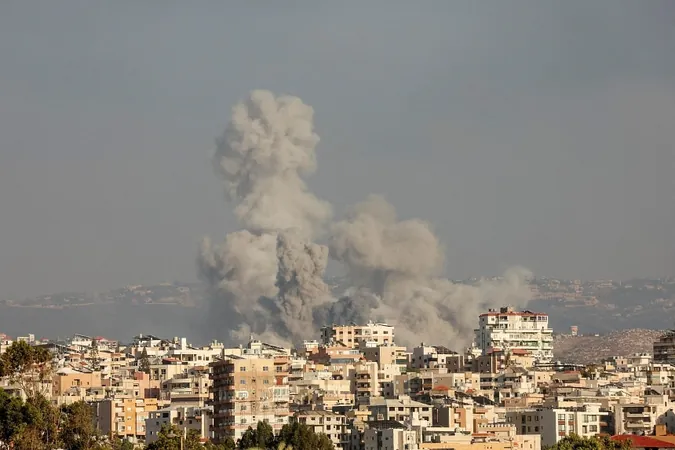
Catastrophic Israeli Strikes on Hezbollah in Lebanon Leave Nearly 500 Dead Amid Intensifying Conflict
2024-09-24
BEIRUT - A harrowing day unfolded on September 23, as Israeli air strike operations across Lebanon resulted in at least 492 fatalities, including 35 children, according to the Health Ministry. This marked a grim milestone as the deadliest day of escalating hostilities sparked by the ongoing Gaza war.
The fierce clashes have prompted vehement condemnation from Arab nations, alarmed by the unprecedented levels of violence between Israel and Hezbollah that have escalated significantly in recent weeks. Following a historic attack on Israel by Hamas militants on October 7, the conflict has drawn Hezbollah and other Iran-aligned groups into a turbulent fray.
Israel claimed that its operations targeted approximately 1,600 sites in southern and eastern Lebanon, saying that many Hezbollah militants were killed in these strikes, part of what is termed “Operation Northern Arrows.” Notably, a strike aimed at the group’s third-in-command, Ali Karake, occurred in Beirut. However, Hezbollah reported that Karake was unharmed and had relocated for safety.
In an apparent retaliation, Hezbollah fired multiple rockets at Israeli military installations, responding to ongoing raids in eastern Lebanon. The situation escalated even further as Israeli air raid sirens sent residents in Haifa scrambling for shelter on the same day.
The scale of destruction in Lebanon is harrowing. The Health Minister, Firass Abiad, reported that the bombings on September 23 also injured over 1,645 individuals and caused massive displacements, with “thousands of families” fleeing their homes in search of safety. The powerful explosions have rattled cities like Baalbek, with dark clouds of smoke rising ominously over ancient landscapes.
As sentiments of despair loom, residents like Wafaa Ismail, a 60-year-old housewife from Zawtar, articulated the bleak reality of life amid continuous bombardment: “We sleep and wake up to bombardment... that’s what our life has become.”
International Calls for Restraint
Major world powers, responding to the surge in violence, called for immediate de-escalation. France and Egypt have sought intervention from the UN Security Council, while Iraq urged neighboring Arab states to convene and address the crisis. Against this backdrop, Israeli army chief Herzi Halevi noted that Israeli strikes were aimed at dismantling Hezbollah’s decades-long military infrastructure.
Israeli Defence Minister Yoav Gallant declared that September 23 marked “a significant peak” in military operations, asserting that entire units of Hezbollah had been incapacitated due to their intensified strikes. Prime Minister Benjamin Netanyahu underscored Israel's need to shift the “security balance” in its favor along the northern frontier.
Escalation of Rocket Fire
As the conflict persists, Hezbollah acknowledged entering a “new phase” of confrontation via rockets directed at Israeli military installations near Haifa—an act of defiance against previous air raids in southern Lebanon and the Bekaa Valley. The violence escalated significantly after Israeli strikes killed Ibrahim Aqil, a commander of Hezbollah's elite Radwan Force, and left a trail of devastation resulting in hundreds of casualties days prior.
Reports indicate that since the recent exchanges between Israel and Hezbollah commenced in October, mass displacements have affected tens of thousands of civilians on both sides. An unnamed Israeli military official relayed that their operations aim to cripple Hezbollah’s capabilities, pushing them away from the border.
Lebanese Prime Minister Najib Mikati has urgently called upon global powers and the UN to intervene and prevent what he characterized as Israel’s plan to soldier forward with “destruction in Lebanese towns and villages.”
The Specter of Full-Scale War
As the standoff continues, U.S. President Joe Biden assured that Washington is striving to reduce hostilities in a manner that could allow for the safe return of displaced individuals. The Pentagon disclosed plans to send a small troop contingency to the Middle East amid widespread concerns of a potential full-fledged war.
Global leaders, including those from the Group of 7, have cautioned against escalating the conflict, foreseeing “unimaginable consequences” for regional stability. The EU’s foreign affairs chief warned that Israel and Hezbollah are “almost in full-fledged war,” ahead of critical discussions among world leaders.
UN Secretary-General Antonio Guterres expressed grave concern about civilian casualties, echoing warnings from UN peacekeeping forces in Lebanon about the dire ramifications of further hostilities.
Citing the precarious situation, Qatari officials and Turkey reiterated that the bombings risk “chaos” and implored an urgent ceasefire to avert further devastation.
The devastating impacts of the ongoing violence stretch beyond Lebanon. The violent conflict has already resulted in a staggering death toll in Gaza—over 41,000 casualties, according to figures from Hamas’ Health Ministry, and continues to fuel concerns among neighboring countries and international advocates for peace.



 Brasil (PT)
Brasil (PT)
 Canada (EN)
Canada (EN)
 Chile (ES)
Chile (ES)
 España (ES)
España (ES)
 France (FR)
France (FR)
 Hong Kong (EN)
Hong Kong (EN)
 Italia (IT)
Italia (IT)
 日本 (JA)
日本 (JA)
 Magyarország (HU)
Magyarország (HU)
 Norge (NO)
Norge (NO)
 Polska (PL)
Polska (PL)
 Schweiz (DE)
Schweiz (DE)
 Singapore (EN)
Singapore (EN)
 Sverige (SV)
Sverige (SV)
 Suomi (FI)
Suomi (FI)
 Türkiye (TR)
Türkiye (TR)